Voters in North Macedonia had another chance to give an opinion on their country's new name as they cast ballots in a presidential election Sunday that was seen as a key test for the center-left government that negotiated the name change to end a decades-old dispute with neighboring Greece.
Three university professors were vying for the largely ceremonial presidency. Outgoing President Gjorge Ivanov, who couldn't seek re-election due to term limits, tried to derail or delay the deal with Greece. North Macedonia previously was known as Macedonia.
Click to Gallery
Voters in North Macedonia had another chance to give an opinion on their country's new name as they cast ballots in a presidential election Sunday that was seen as a key test for the center-left government that negotiated the name change to end a decades-old dispute with neighboring Greece.
The deal emerged as the main campaign issue of Sunday's presidential. The candidate who was backed by the main conservative opposition VMRO-DPMNE party has vowed to challenge the agreement in the International Court of Justice in The Hague.
Blerim Reka, a presidential candidate supported by two small ethnic Albanian political parties, expressed hope that North Macedonia will "prove that is ready for the start of the accession talks with the European Union."
More than 3,000 domestic and about 420 international observers were monitoring the election.
"I expect the situation to change for us young people and also changes in the country, our living conditions to improve and to go forward toward European Union and NATO," Kocevski said.
Gordana Siljanovska Davkova, a presidential candidate for the opposition conservative VMRO-DPMNE party, talks to the media outside a polling station, after voting in the presidential elections, in Skopje, North Macedonia, Sunday, April 21, 2019. North Macedonia holds the first round of presidential elections on Sunday, seen as key test of the government following deep polarization after the country changed its name to end a decades-old dispute with neighboring Greece over the use of the term "Macedonia". (AP PhotoBoris Grdanoski)
Gordana Siljanovska Davkova, center, a presidential candidate for the opposition conservative VMRO-DPMNE party, accompanied by her husband Blagoja and daughter Marija leaves a polling station after voting in the presidential elections, in Skopje, North Macedonia, Sunday, April 21, 2019. North Macedonia holds the first round of presidential elections on Sunday, seen as key test of the government following deep polarization after the country changed its name to end a decades-old dispute with neighboring Greece over the use of the term "Macedonia". (AP PhotoBoris Grdanoski)
A man looks at his ballot behind a voting booth at a polling station, during the presidential elections in Skopje, North Macedonia, Sunday, April 21, 2019. North Macedonia holds the first round of presidential elections on Sunday, seen as key test of the government following deep polarization after the country changed its name to end a decades-old dispute with neighboring Greece over the use of the term "Macedonia". (AP PhotoBoris Grdanoski)
The name change, which took effect in February, put the former Yugoslav republic on the path to membership in NATO and the European Union. Greece had blocked the move for decades, asserting sole rights to the Macedonia name.
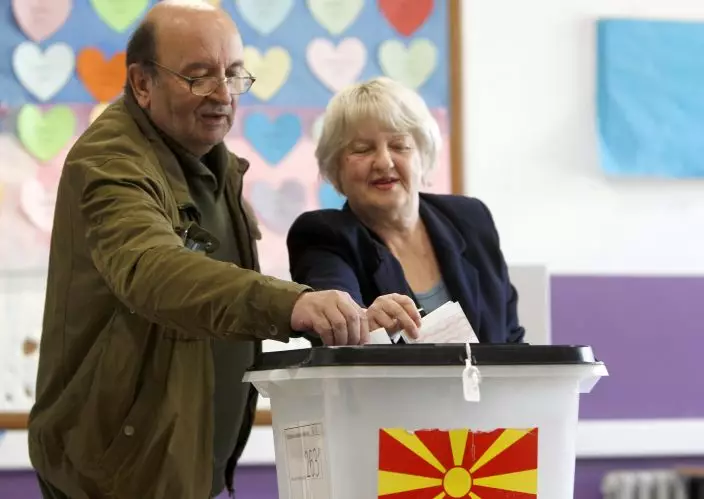
A couple cast their ballots for the presidential election at a polling station in Skopje, North Macedonia, Sunday, April 21, 2019. Polls were opened early on Sunday in North Macedonia for presidential elections seen as key test of the government following deep polarization after the country changed its name to end a decades-old dispute with neighboring Greece over the use of the term "Macedonia". (AP PhotoBoris Grdanoski)
The deal emerged as the main campaign issue of Sunday's presidential. The candidate who was backed by the main conservative opposition VMRO-DPMNE party has vowed to challenge the agreement in the International Court of Justice in The Hague.
Gordana Siljanovska Davkova, a vocal opponent of the name deal, said that as a constitutional law professor who is devoted to the rule of law, she would "respect" the agreement, but also "will do my best to show that some of the solutions are against Macedonia's Constitution and against...the norms of the United Nations."
Stevo Pendarovski, the joint candidate of the ruling Social Democrats and 30 other parties, told reporters after he voted in the capital of Skopje that he expects North Macedonia to become a full member of NATO and the EU. He said he is a strong supporter of the deal with Greece that "fully preserves the national interest of both countries."
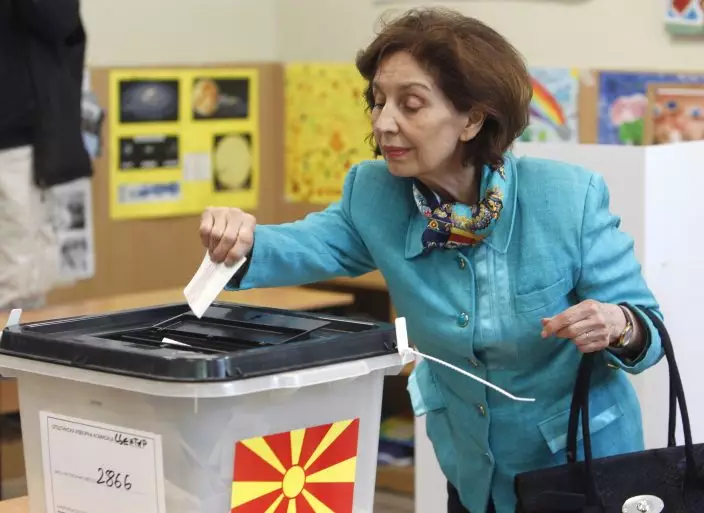
Gordana Siljanovska Davkova, a presidential candidate for the opposition conservative VMRO-DPMNE party, casts her ballot for the presidential elections at a polling station in Skopje, North Macedonia, Sunday, April 21, 2019. North Macedonia holds the first round of presidential elections on Sunday, seen as key test of the government following deep polarization after the country changed its name to end a decades-old dispute with neighboring Greece over the use of the term "Macedonia". (AP PhotoBoris Grdanoski)
Blerim Reka, a presidential candidate supported by two small ethnic Albanian political parties, expressed hope that North Macedonia will "prove that is ready for the start of the accession talks with the European Union."
More than 3,400 polling stations opened at 7 a.m. local time (0500 GMT) and will close at 7 p.m. (1700GMT). By 1 p.m., turnout of the country's 1.8 million registered voters was 20.45%, election authorities said. The public referendum on the name change also had low turnout.
A candidate needs 50% plus one vote to win the election outright. Heading into Sunday's vote, a May 5 runoff was seen as all but certain.
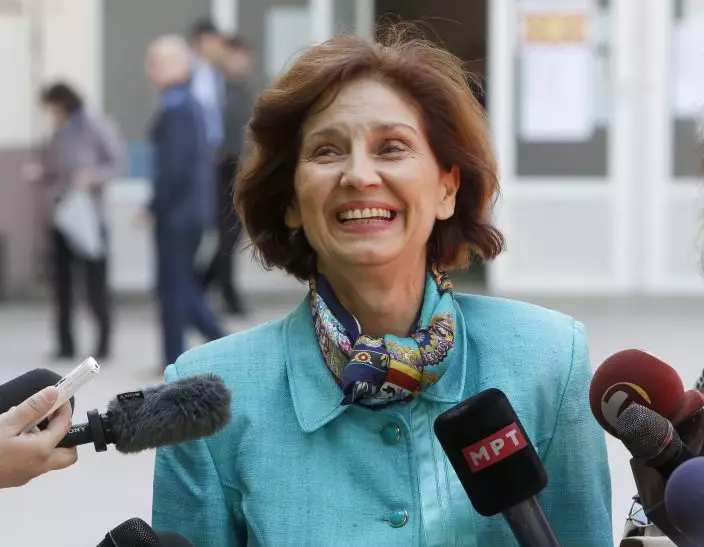
Gordana Siljanovska Davkova, a presidential candidate for the opposition conservative VMRO-DPMNE party, talks for the media outside a polling station, after voting for the presidential elections, in Skopje, North Macedonia, Sunday, April 21, 2019. North Macedonia holds the first round of presidential elections on Sunday, seen as key test of the government following deep polarization after the country changed its name to end a decades-old dispute with neighboring Greece over the use of the term "Macedonia". (AP PhotoBoris Grdanoski)
More than 3,000 domestic and about 420 international observers were monitoring the election.
North Macedonia's struggles include a stagnant economy, more than 20% unemployment and pervasive corruption. At least 400,000 people, most of them young, have left the country in the past decade.
Some residents hope for something better. Voter Stefan Kocevski said he expects the election to bring "positivity and change."

Stevo Pendarovski, left, a presidential candidate of the ruling coalition led by the Social Democrats and his wife Elizabeth Gjorgievska cast their ballots for the presidential elections at a polling station in Skopje, North Macedonia, Sunday, April 21, 2019. North Macedonia holds the first round of presidential elections on Sunday, seen as key test of the government following deep polarization after the country changed its name to end a decades-old dispute with neighboring Greece over the use of the term "Macedonia". (AP PhotoBoris Grdanoski)
"I expect the situation to change for us young people and also changes in the country, our living conditions to improve and to go forward toward European Union and NATO," Kocevski said.
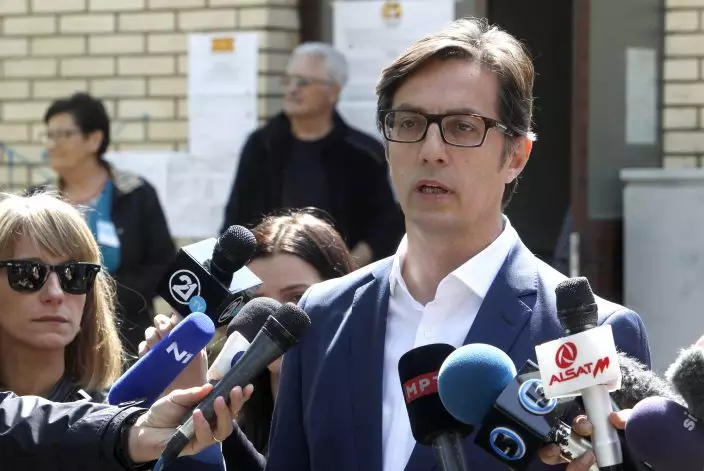
Stevo Pendarovski, presidential candidate of the ruling coalition led by the Social Democrats, talks to the media outside a polling station after voting in the presidential election in Skopje, North Macedonia, Sunday, April 21, 2019. North Macedonia holds the first round of presidential elections on Sunday, seen as key test of the government following deep polarization after the country changed its name to end a decades-old dispute with neighboring Greece over the use of the term "Macedonia". (AP PhotoBoris Grdanoski)
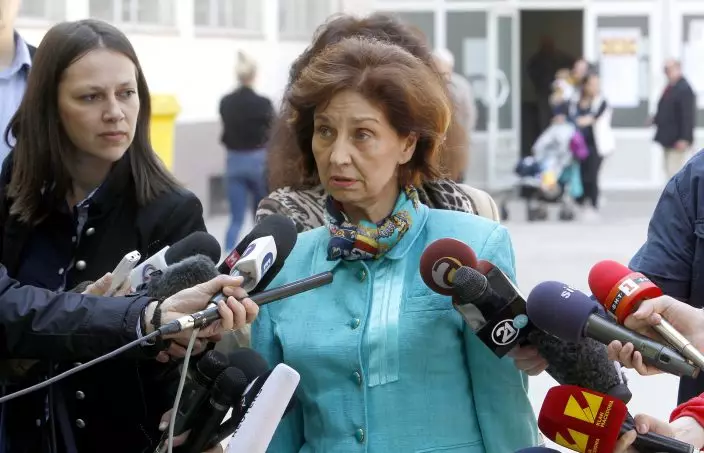
Gordana Siljanovska Davkova, a presidential candidate for the opposition conservative VMRO-DPMNE party, talks to the media outside a polling station, after voting in the presidential elections, in Skopje, North Macedonia, Sunday, April 21, 2019. North Macedonia holds the first round of presidential elections on Sunday, seen as key test of the government following deep polarization after the country changed its name to end a decades-old dispute with neighboring Greece over the use of the term "Macedonia". (AP PhotoBoris Grdanoski)
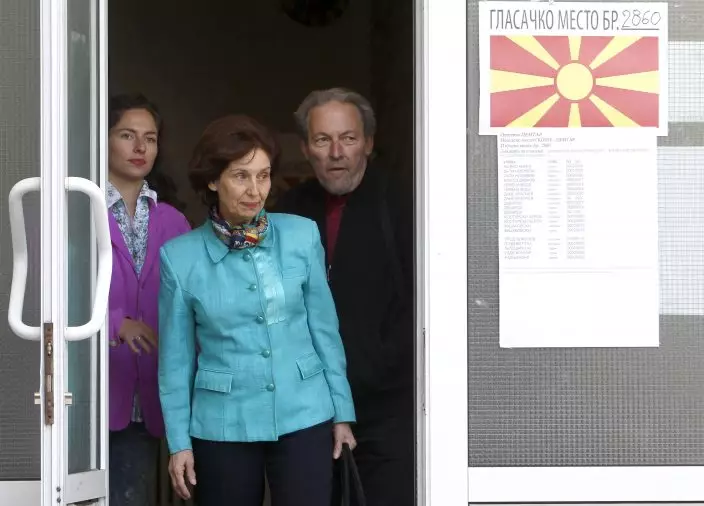
Gordana Siljanovska Davkova, center, a presidential candidate for the opposition conservative VMRO-DPMNE party, accompanied by her husband Blagoja and daughter Marija leaves a polling station after voting in the presidential elections, in Skopje, North Macedonia, Sunday, April 21, 2019. North Macedonia holds the first round of presidential elections on Sunday, seen as key test of the government following deep polarization after the country changed its name to end a decades-old dispute with neighboring Greece over the use of the term "Macedonia". (AP PhotoBoris Grdanoski)
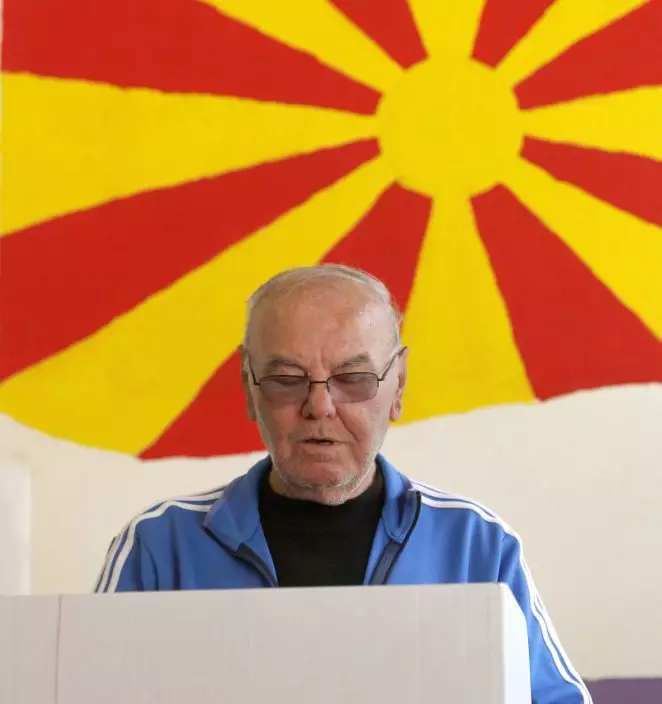
A man looks at his ballot behind a voting booth at a polling station, during the presidential elections in Skopje, North Macedonia, Sunday, April 21, 2019. North Macedonia holds the first round of presidential elections on Sunday, seen as key test of the government following deep polarization after the country changed its name to end a decades-old dispute with neighboring Greece over the use of the term "Macedonia". (AP PhotoBoris Grdanoski)
PARIS (AP) — French President Emmanuel Macron warned Thursday that Europe could “die” if it fails to build its own robust defense as Russia’s war in Ukraine rages on, or if it fails to undertake major trade and economic reforms to compete with China and the U.S.
Macron urged Europeans to become more ambitious in a fast-changing world to face the challenges of war, fierce trade competition, energy scarcity, climate change and increasing authoritarianism.
In a nearly two-hour speech at Sorbonne University in Paris, Macron said that the continent is divided and “too slow and lacks ambition” at a time when the 27-member European Union needs to become a superpower, defend its own borders and speak with one voice if it wants to survive and thrive.
“Our Europe today is mortal,” Macron said. “It can die and that depends solely on our choices,” he added. He called on people to make those choices now because, “it’s today that Europe is between war and peace.”
Russia's full-scale invasion of Ukraine, now in its third year, is an existential threat and Europe isn't armed enough to defend itself when “confronted by a power like Russia that has no inhibitions, no limits,” Macron said.
‘Our ability to ensure our security is at stake," Macron said. “Russia mustn’t be allowed to win.”
Europe now has the “good fortune” of having the Biden administration’s commitment to supporting Ukraine, Macron said. But, in a year of key elections around Europe, in the U.S. and elsewhere, support may fragment or disappear entirely, he added.
“Europe must become capable of defending its interests, with its allies by our side whenever they are willing, and alone if necessary,” Macron said.
Strong armies, a European rapid intervention program and force, tanks, a missile shield and other weapons, produced in Europe, will need the support of “a joint diplomatic force that will speak with one voice and build bridges with Africa and Latin America,” the French leader said.
“Only then will Europe show that it's not a United States’ lap dog, and that it also knows how to talk to other regions of the world,” he said.
France has been a firm supporter of Ukraine in its fight against Russian aggression, and Macron has often clashed with other Western leaders as he has insisted that Europe must stand by the country at any cost. The French president alarmed European leaders by saying recently that sending Western troops into Ukraine to shore up its defenses shouldn’t be ruled out.
Referring to trade practices of China and the U.S., Macron said “the two world powers have decided not to respect the rules of global trade” by shoring up protections and subsides while Europe’s industry remains open and is stuck in overregulation.
“Let’s do the same, we are in competition,” Macron said.
“We must buy faster, we must produce more and we must buy more that is made in Europe. That is key,” Macron said.
Thursday's speech came less than two months before a pivotal European Parliament election.
Macron, an avid advocate of a united and assertive Europe, also rallied support for his centrist Renaissance party before the June 6-9 vote as far-right parties lead the moderate coalitions in the polls. He called for safeguarding democratic values as the “authoritarian model” was becoming “more popular” across the continent.
The war in Ukraine and immigration are top priorities for European Union voters, according to polls. Far-right parties have gained support by criticizing Macron’s government policies on both issues. Macron acknowledged divisions on immigration policies, including on asylum and deportation rules for those who have arrived to Europe illegally.
He emphasized the need for an effective response and Europe-wide coordination for curbing illegal immigration, closer cooperation with immigrants' countries of origin and a unified, relentless fight against human traffickers.
Macron criticized the idea of striking an agreement, as Britain as done, with countries in Africa and elsewhere to transfer immigrants there.
“This is a betrayal of our values that ultimately leads us to dependency on other counties,” Macron said.
The British government earlier this week approved a law allowing the deportation of some migrants who enter the country illegally to Rwanda.
Macron lost his majority in France’s most influential house of parliament, the National Assembly, after the 2022 election to the far-left coalition and the far-right National Rally party.
The social situation in France remains tense as Paris prepares to host the Olympic Games this summer, amid protests from teachers and police officers, and farmer demonstrations in recent weeks. The protests follow huge rallies last year against Macron’s ultimately successful proposal to increase the retirement age from 62 to 64.
Barbara Surk reported from Nice, France. Lorne Cook contributed to this report from Brussels.
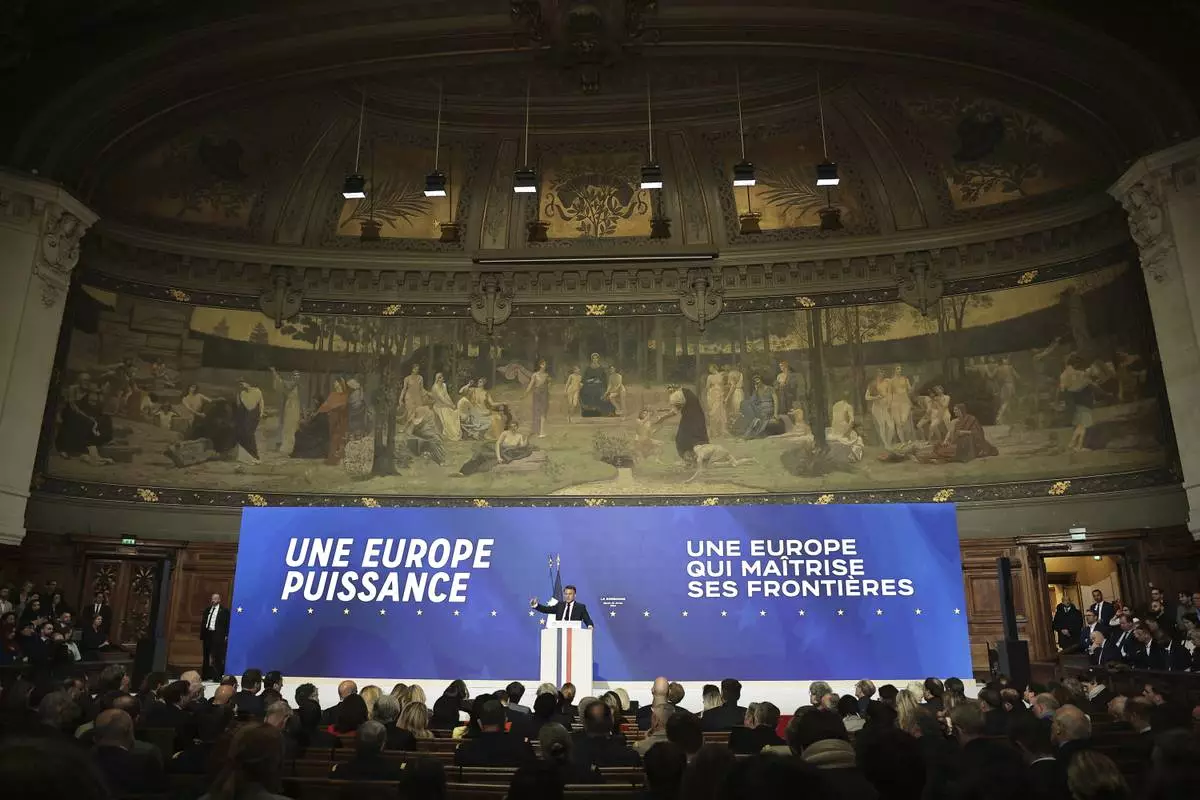
French President Emmanuel Macron delivers a speech on Europe in the amphitheater of the Sorbonne University, Thursday, April 25 in Paris. 2024. French President Emmanuel Macron will outline his vision for Europe as a more assertive global power at the backdrop of war in Ukraine, security, and economic challenges in a speech ahead of pivotal election for the European Parliament in June. (Christophe Petit Tesson, Pool via AP)
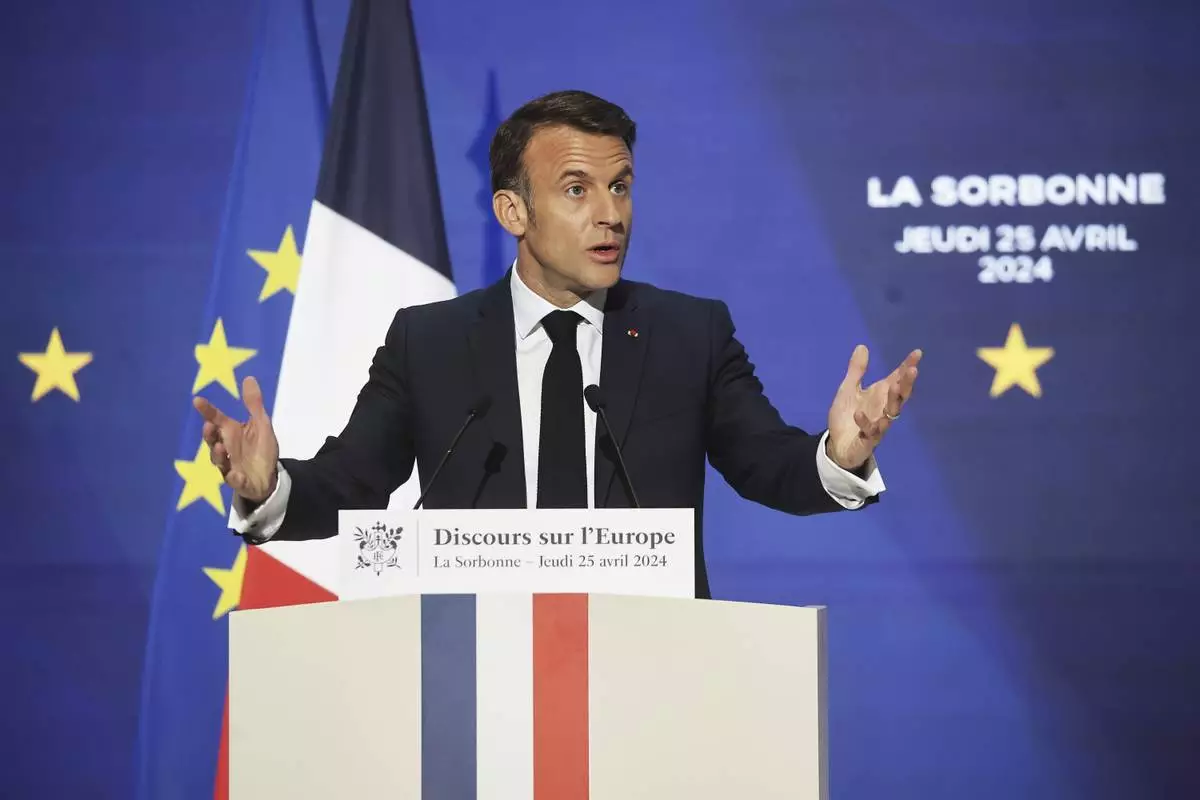
French President Emmanuel Macron delivers a speech on Europe in the amphitheater of the Sorbonne University, Thursday, April 25 in Paris. 2024. French President Emmanuel Macron will outline his vision for Europe as a more assertive global power at the backdrop of war in Ukraine, security, and economic challenges in a speech ahead of pivotal election for the European Parliament in June. (Christophe Petit Tesson, Pool via AP)
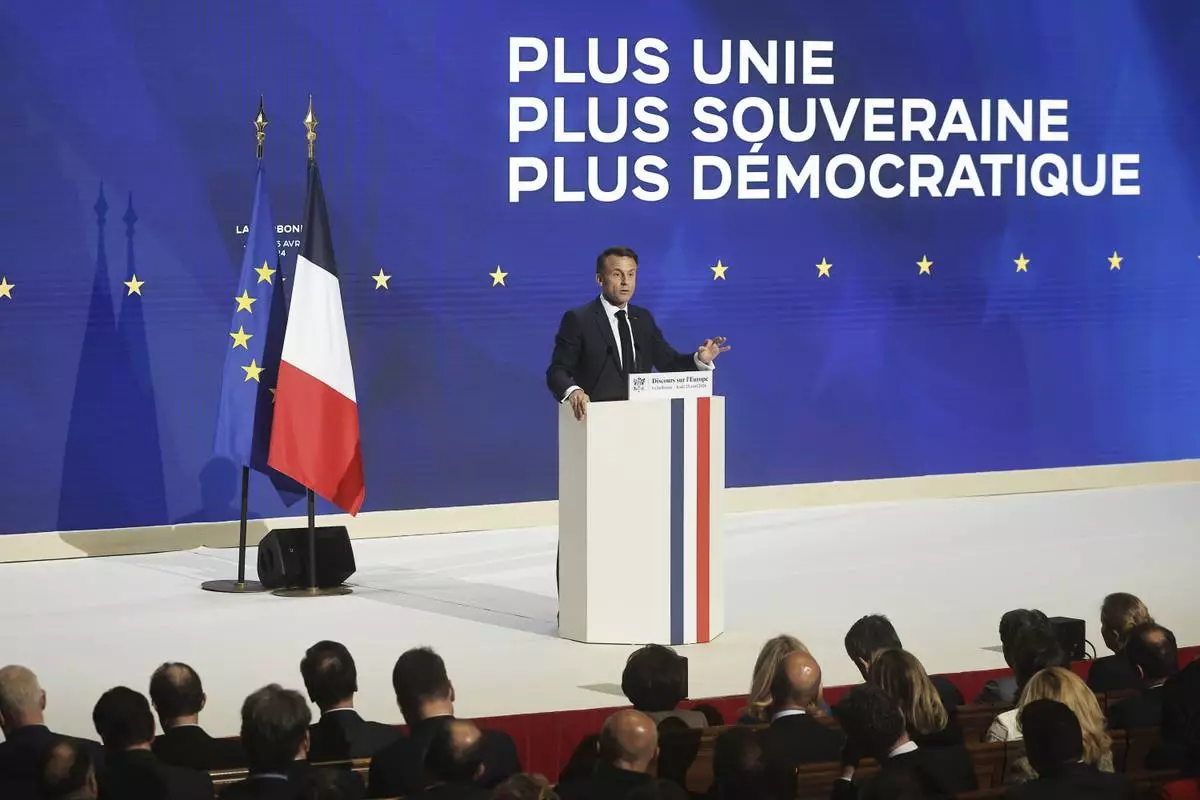
French President Emmanuel Macron delivers a speech on Europe in the amphitheater of the Sorbonne University, Thursday, April 25 in Paris. 2024. French President Emmanuel Macron will outline his vision for Europe as a more assertive global power at the backdrop of war in Ukraine, security, and economic challenges in a speech ahead of pivotal election for the European Parliament in June. (Christophe Petit Tesson, Pool via AP)
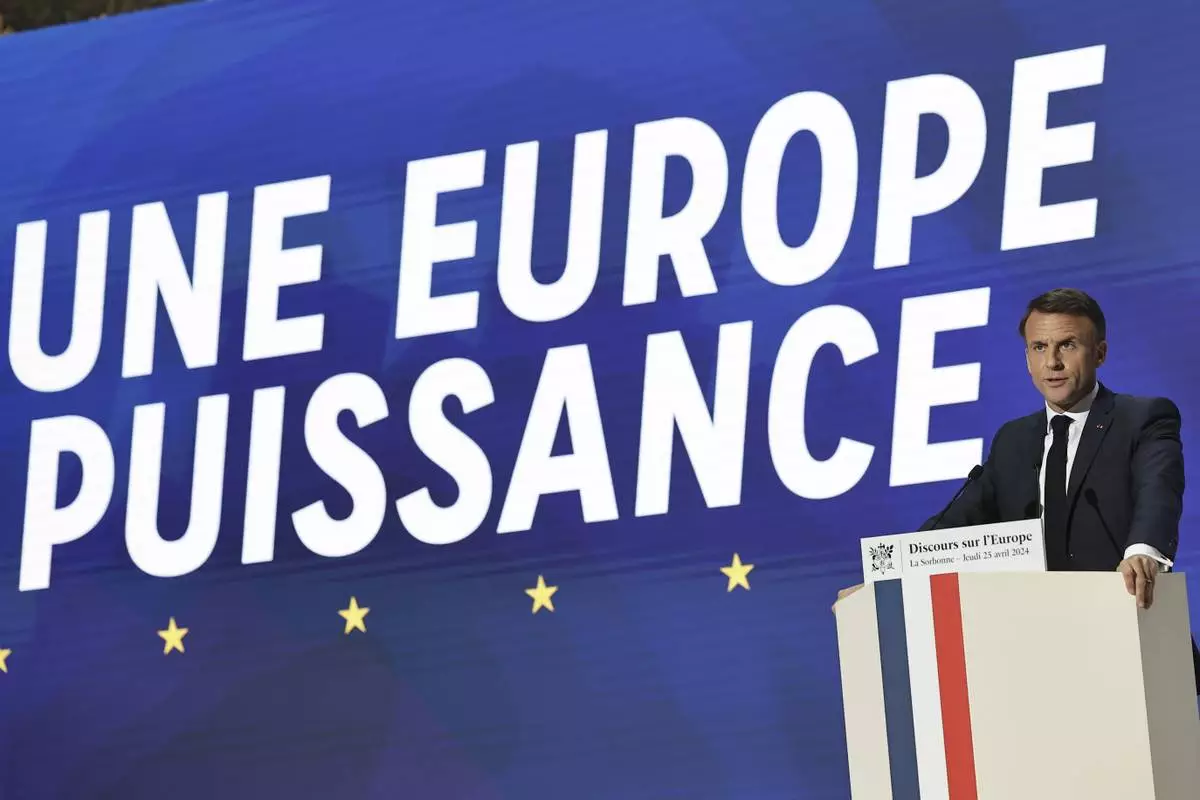
French President Emmanuel Macron delivers a speech on Europe in the amphitheater of the Sorbonne University, Thursday, April 25 in Paris. 2024. French President Emmanuel Macron will outline his vision for Europe as a more assertive global power at the backdrop of war in Ukraine, security, and economic challenges in a speech ahead of pivotal election for the European Parliament in June. (Christophe Petit Tesson, Pool via AP)
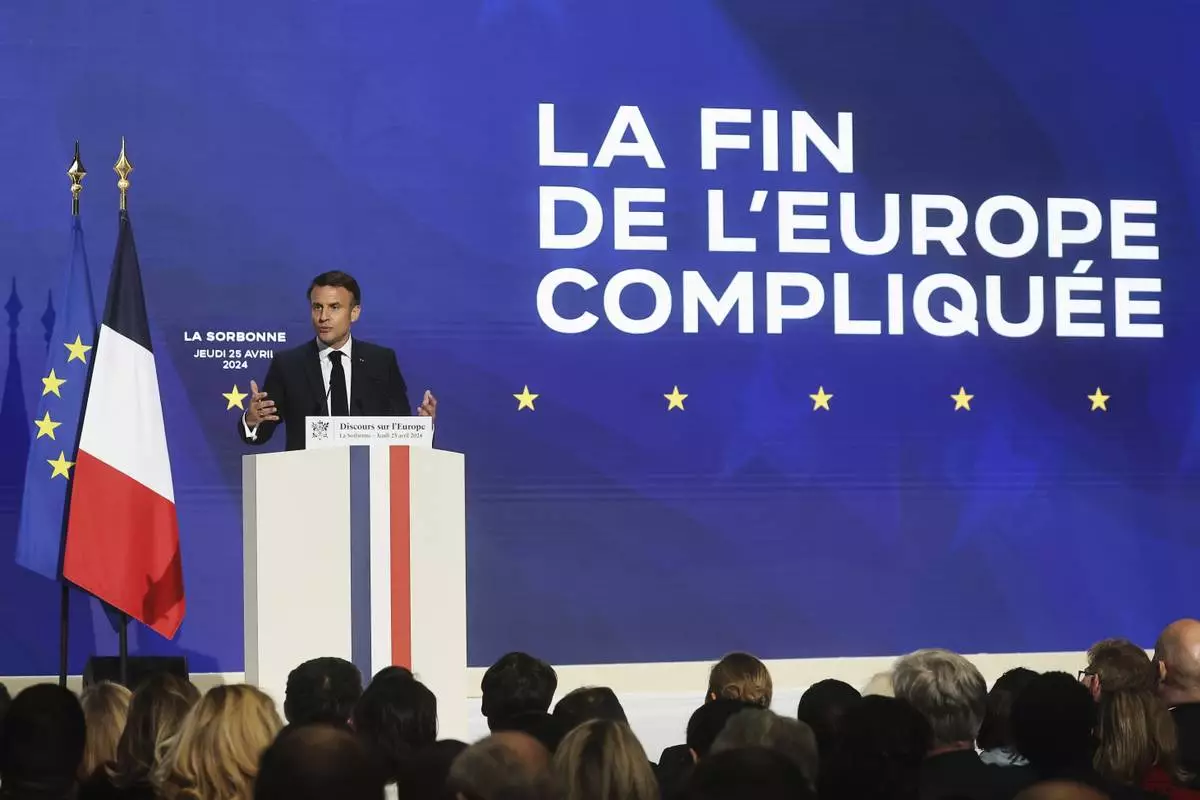
French President Emmanuel Macron delivers a speech on Europe in the amphitheater of the Sorbonne University, Thursday, April 25 in Paris. 2024. French President Emmanuel Macron will outline his vision for Europe as a more assertive global power at the backdrop of war in Ukraine, security, and economic challenges in a speech ahead of pivotal election for the European Parliament in June. (Christophe Petit Tesson, Pool via AP)
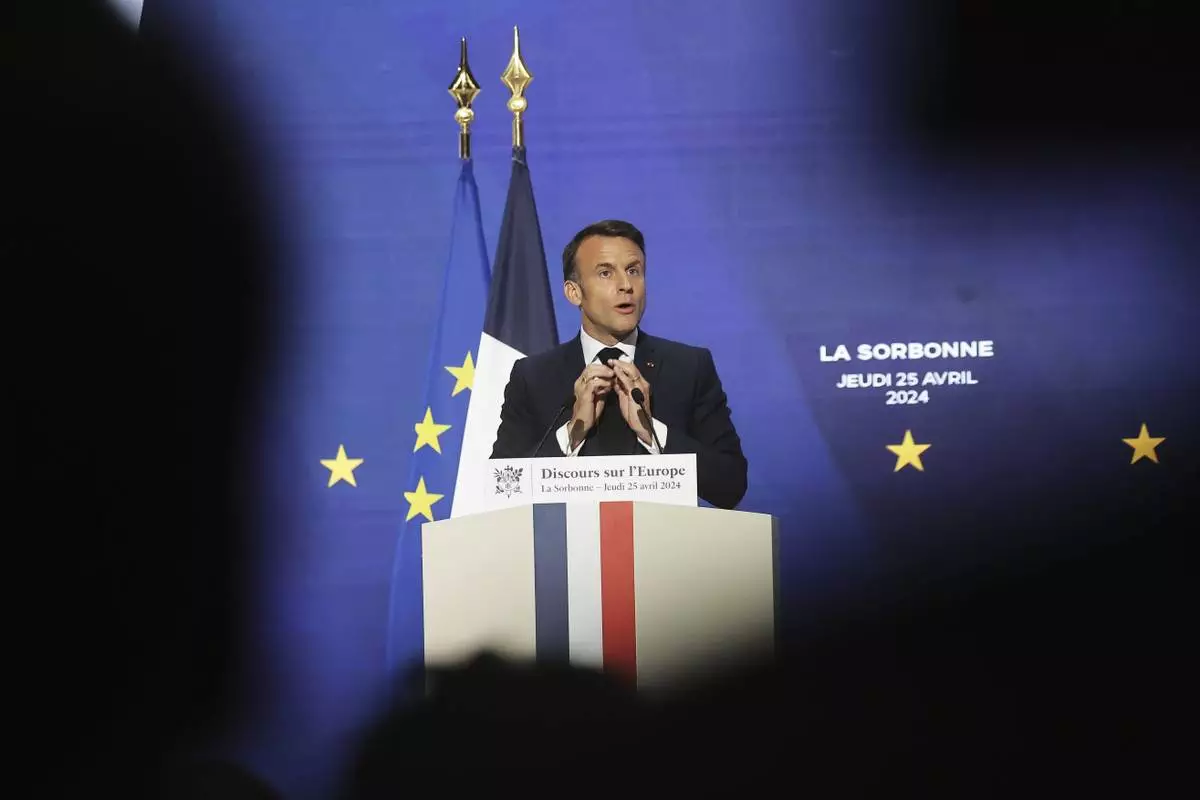
French President Emmanuel Macron delivers a speech on Europe in the amphitheater of the Sorbonne University, Thursday, April 25 in Paris. 2024. French President Emmanuel Macron will outline his vision for Europe as a more assertive global power at the backdrop of war in Ukraine, security, and economic challenges in a speech ahead of pivotal election for the European Parliament in June. (Christophe Petit Tesson, Pool via AP)
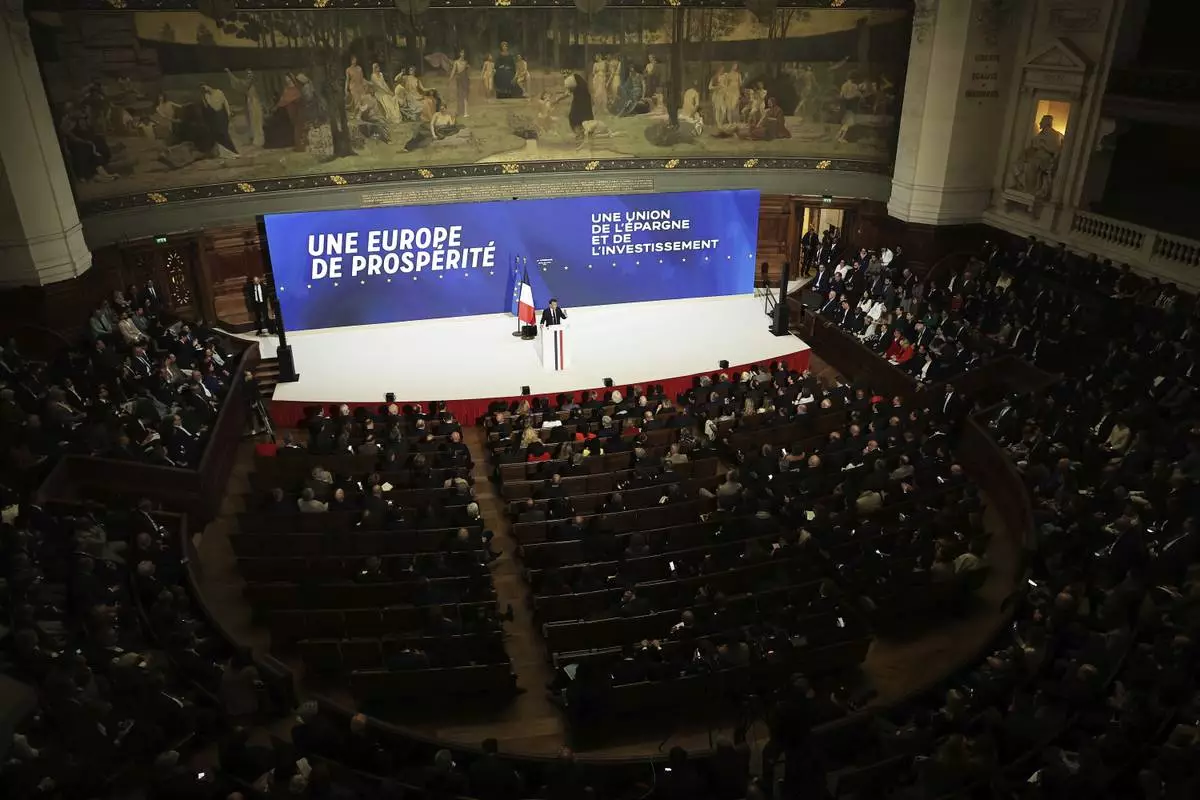
French President Emmanuel Macron delivers a speech on Europe in the amphitheater of the Sorbonne University, Thursday, April 25 in Paris. 2024. French President Emmanuel Macron will outline his vision for Europe as a more assertive global power at the backdrop of war in Ukraine, security, and economic challenges in a speech ahead of pivotal election for the European Parliament in June. (Christophe Petit Tesson, Pool via AP)
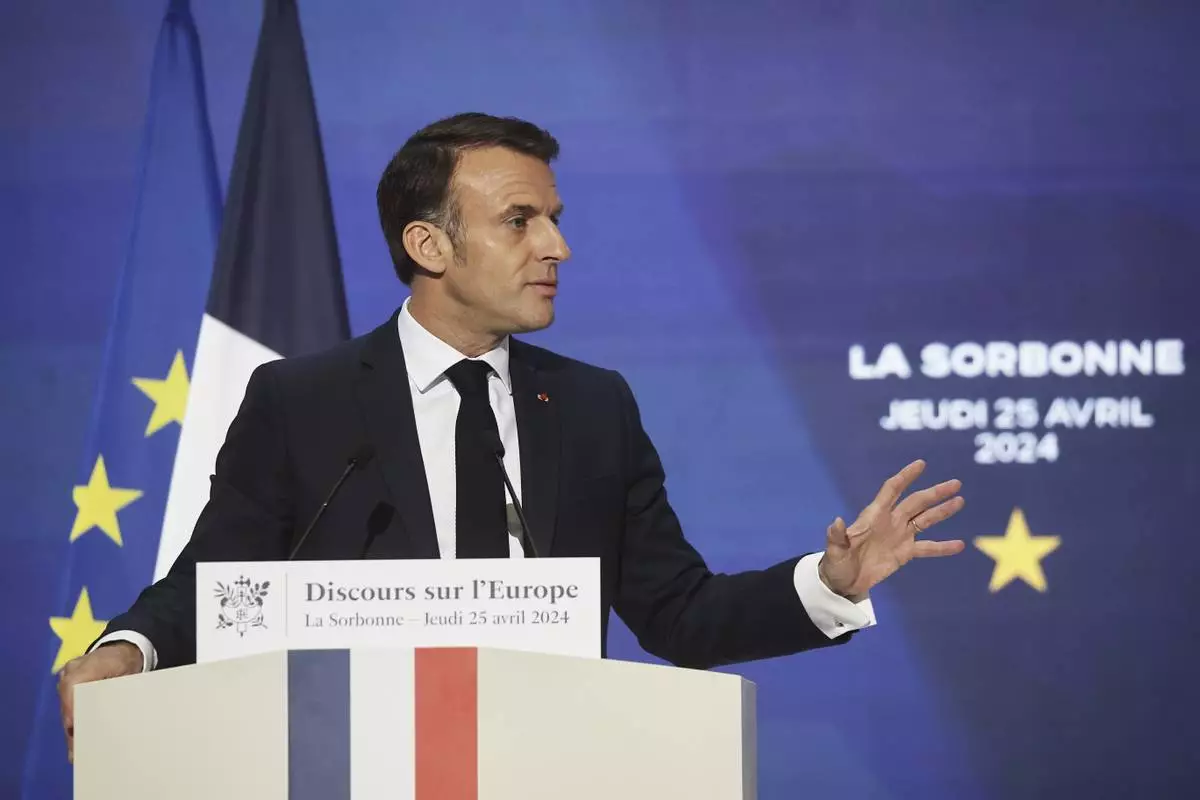
French President Emmanuel Macron delivers a speech on Europe in the amphitheater of the Sorbonne University, Thursday, April 25 in Paris. 2024. French President Emmanuel Macron will outline his vision for Europe as a more assertive global power at the backdrop of war in Ukraine, security, and economic challenges in a speech ahead of pivotal election for the European Parliament in June. (Christophe Petit Tesson, Pool via AP)
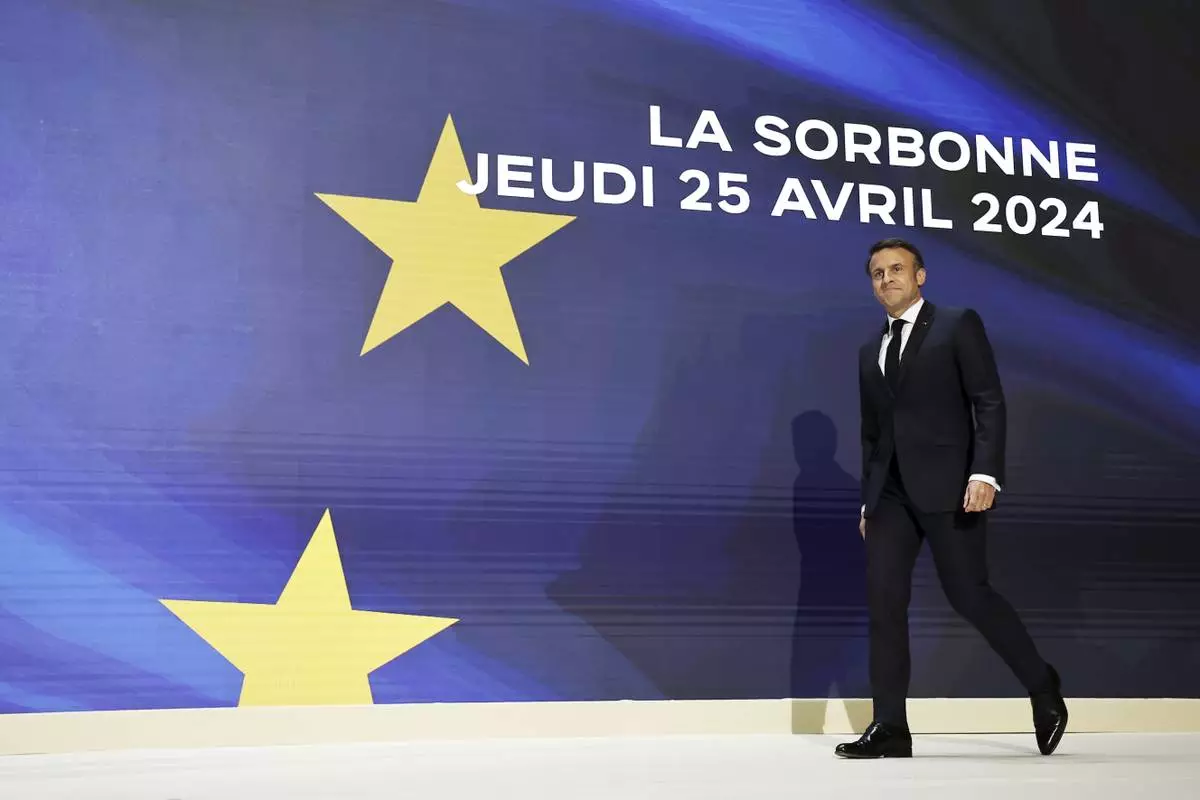
French President Emmanuel Macron arrives to deliver a speech on Europe in the amphitheater of the Sorbonne University, Thursday, April 25 in Paris. 2024. French President Emmanuel Macron will outline his vision for Europe as a more assertive global power at the backdrop of war in Ukraine, security, and economic challenges in a speech ahead of pivotal election for the European Parliament in June. (Christophe Petit Tesson, Pool via AP)
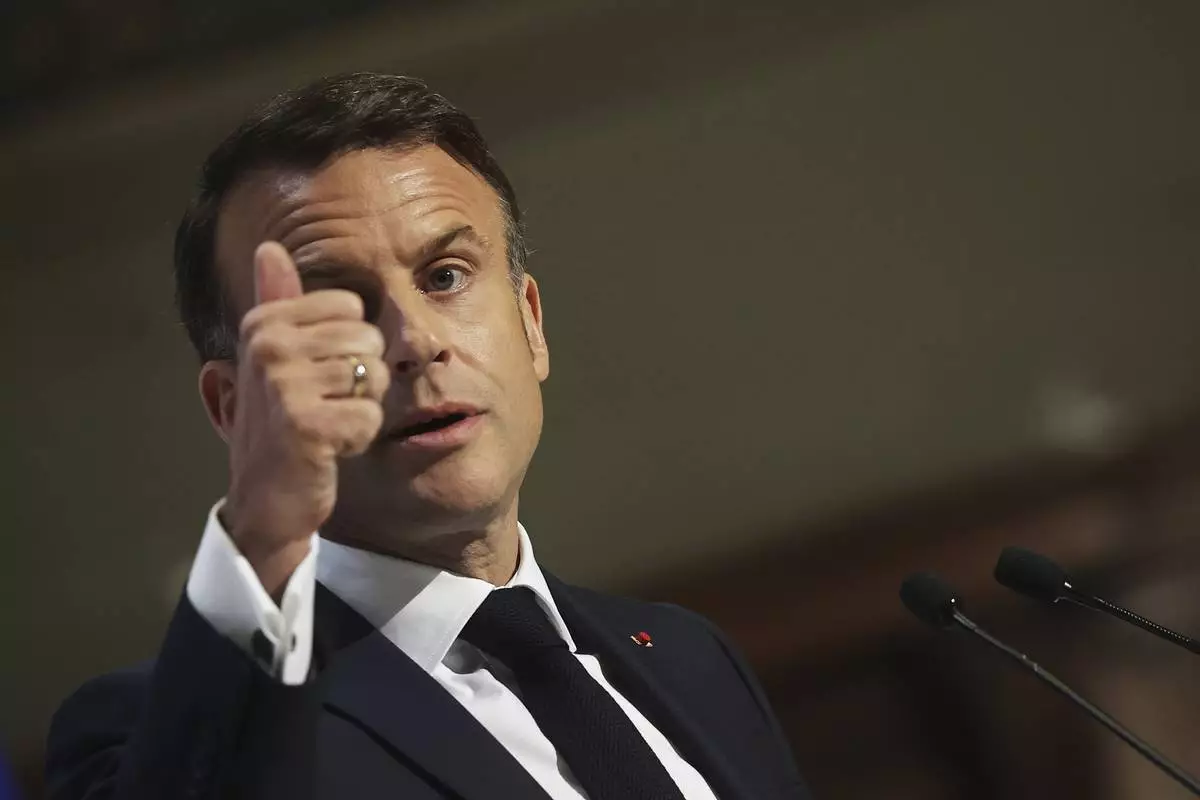
French President Emmanuel Macron delivers a speech on Europe in the amphitheater of the Sorbonne University, Thursday, April 25 in Paris. 2024. French President Emmanuel Macron will outline his vision for Europe as a more assertive global power at the backdrop of war in Ukraine, security, and economic challenges in a speech ahead of pivotal election for the European Parliament in June. (Christophe Petit Tesson, Pool via AP)
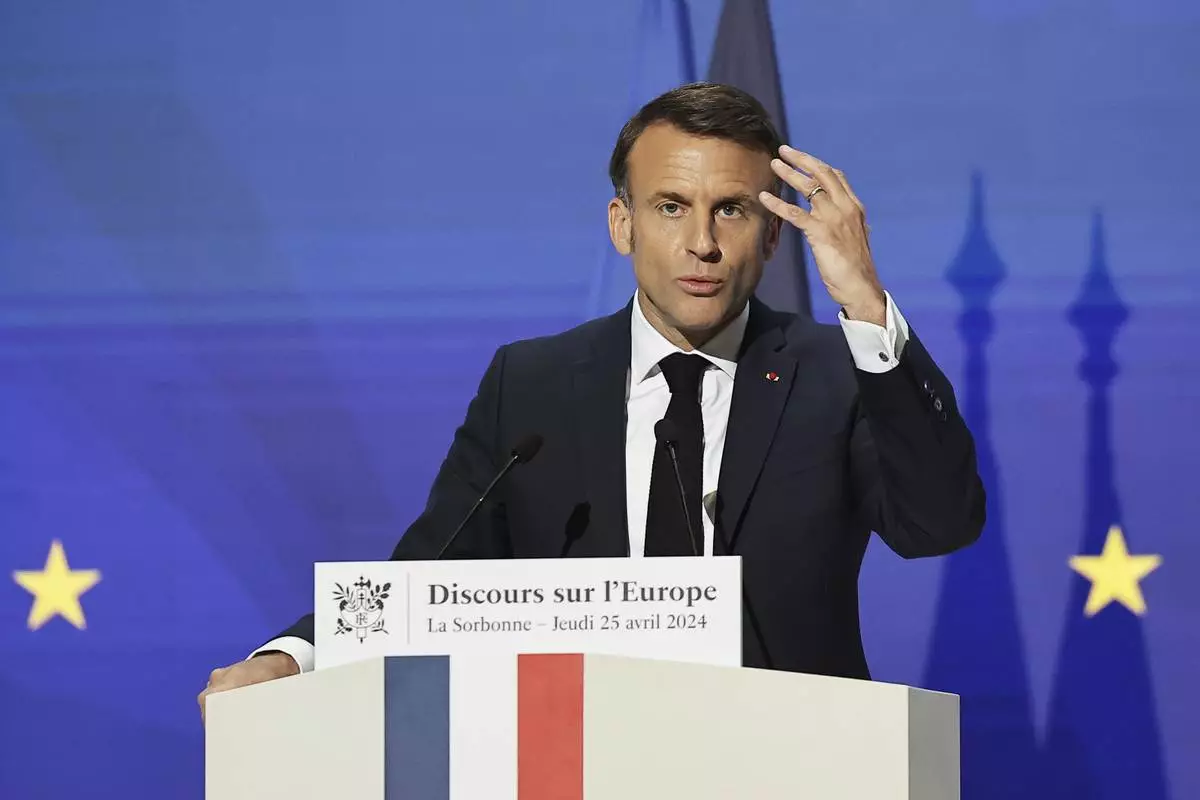
French President Emmanuel Macron delivers a speech on Europe in the amphitheater of the Sorbonne University, Thursday, April 25 in Paris. 2024. French President Emmanuel Macron will outline his vision for Europe as a more assertive global power at the backdrop of war in Ukraine, security, and economic challenges in a speech ahead of pivotal election for the European Parliament in June. (Christophe Petit Tesson, Pool via AP)
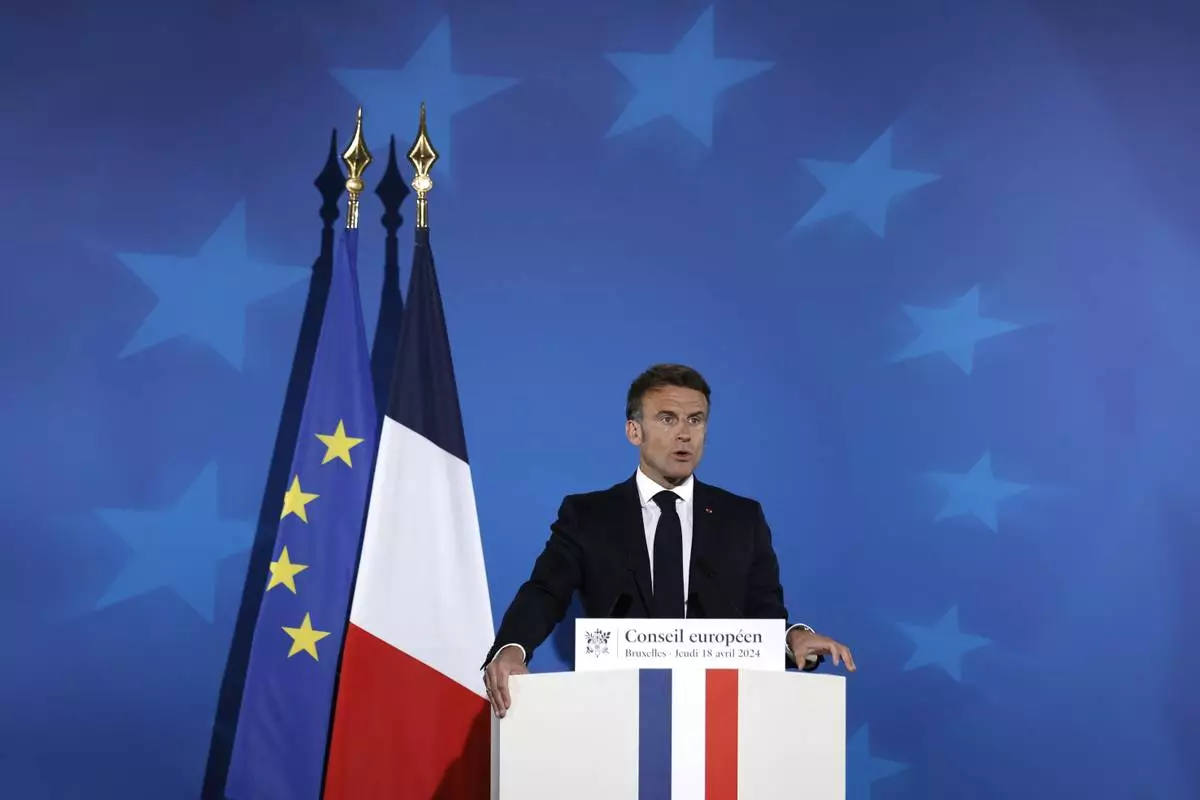
French President Emmanuel Macron speaks during a media conference at an EU summit in Brussels, Thursday, April 18, 2024. European Union leaders on Wednesday debated a new "European Competitiveness Deal" aimed at helping the 27-nation bloc close the gap with Chinese and American rivals amid fears the region's industries will otherwise be left behind for good. (AP Photo/Omar Havana)





























